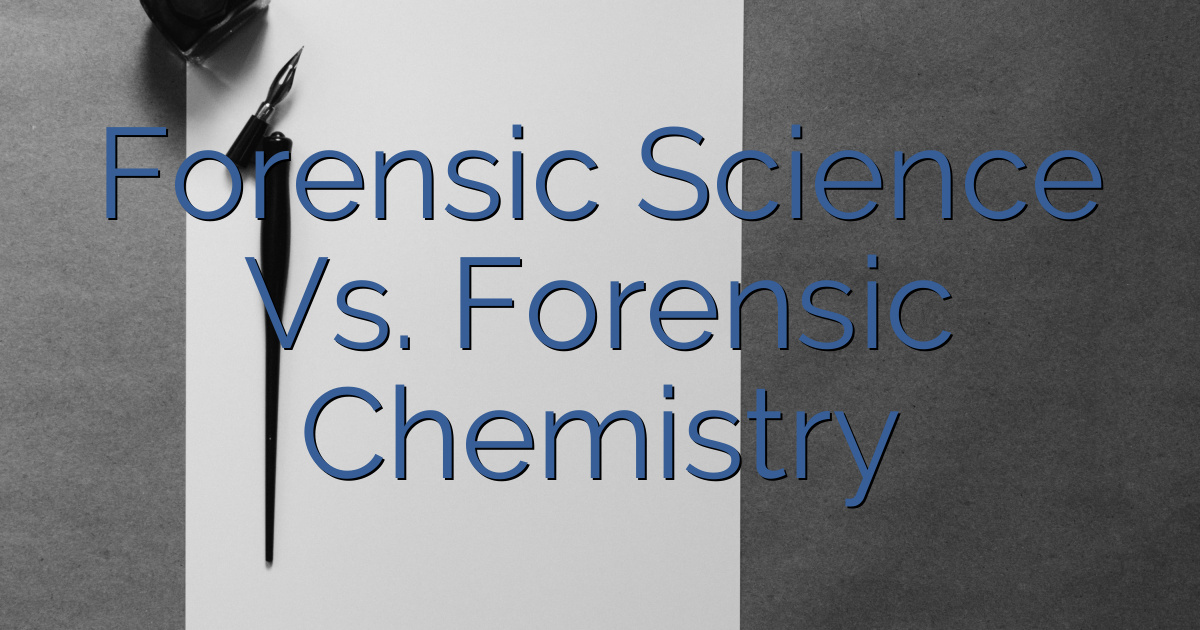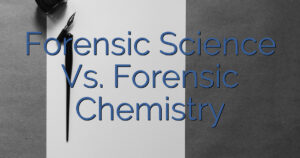 Are you fascinated by crime scenes and the science behind solving mysteries? Do you find yourself torn between pursuing a degree in Forensic Science or Forensic Chemistry? Look no further, because this article will provide you with an objective and analytical comparison of these two majors.
Discover the differences in curriculum, analytical skills developed, career opportunities, and salary potential. Consider your interests and make an informed decision that will shape your future in the captivating world of forensic investigation.
Are you fascinated by crime scenes and the science behind solving mysteries? Do you find yourself torn between pursuing a degree in Forensic Science or Forensic Chemistry? Look no further, because this article will provide you with an objective and analytical comparison of these two majors.
Discover the differences in curriculum, analytical skills developed, career opportunities, and salary potential. Consider your interests and make an informed decision that will shape your future in the captivating world of forensic investigation.
Table of Contents
Key Takeaways
- Forensic science applies scientific principles to crime investigation and involves collecting and analyzing physical evidence.
- Forensic chemistry focuses on the chemical analysis of evidence and emphasizes the chemical aspects of forensic analysis.
- Lab techniques such as microscopy, spectroscopy, DNA analysis, and chromatography play a crucial role in solving crimes and providing evidence in both majors.
- Both forensic science and forensic chemistry require strong analytical skills, critical thinking, and practical experiences to develop the necessary skills for real-world investigations.
Overview of the two majors: Forensic Science and Forensic Chemistry
If you’re trying to decide between forensic science and forensic chemistry, it’s important to understand the differences and similarities between the two majors. Forensic science focuses on the application of scientific principles to the investigation of crimes. It involves the collection and analysis of physical evidence, as well as the use of various techniques and technologies to reconstruct crime scenes. Practical skills development is a key component of forensic science programs, as students learn how to properly handle and analyze evidence. On the other hand, forensic chemistry is a more specialized field that focuses specifically on the chemical analysis of evidence. It involves the identification and interpretation of substances such as drugs, toxins, and trace elements. Both majors have real-world applications in criminal investigations and court proceedings, but forensic chemistry places a greater emphasis on the chemical aspects of forensic analysis.Overview of the curriculum of the two majors: Forensic Science and Forensic Chemistry – Lab Techniques
To understand the differences between the two majors, you’ll need to take a closer look at the lab techniques involved in each. Here are the lab techniques used in both forensic science and forensic chemistry:- Microscopy: Both majors require the use of microscopes to analyze evidence such as fibers, hair, and biological samples. Microscopy helps in identifying and comparing microscopic characteristics.
- Spectroscopy: In forensic chemistry, spectroscopic techniques like infrared spectroscopy and mass spectrometry are utilized to identify and analyze the chemical composition of substances found at crime scenes. Forensic scientists also use spectroscopy to examine evidence such as gunshot residue and paint analysis.
- DNA Analysis: This technique is extensively used in both majors for identifying suspects and victims, establishing familial relationships, and linking individuals to crime scenes through the analysis of DNA profiles.
- Chromatography: Forensic chemists employ various types of chromatography, such as gas chromatography and liquid chromatography, to separate and analyze complex mixtures of substances found in drugs, toxins, and other forensic samples.
Overview of coursework, assessments, and practical applications
The coursework in both majors includes a combination of theoretical knowledge, practical skills, and assessments to ensure students have a well-rounded understanding of the field. In terms of coursework flexibility, both forensic science and forensic chemistry majors offer a range of elective courses that allow students to specialize in specific areas of interest. This flexibility allows students to tailor their education to their career goals and interests within the field. Additionally, both majors provide hands-on experience opportunities through laboratory work, fieldwork, and internships. These practical applications are crucial in developing the necessary skills for real-world forensic investigations.Comparison of Analytical Skills Developed
When developing analytical skills in your chosen major, you will have opportunities to apply theoretical knowledge to practical scenarios through hands-on experiences such as laboratory work, fieldwork, and internships. In forensic science, you will develop analytical techniques to analyze evidence collected from crime scenes. These techniques include DNA analysis, fingerprint analysis, and ballistics analysis. The focus is on problem-solving skills and using scientific methods to gather and interpret data. On the other hand, forensic chemistry emphasizes the application of chemical principles to analyze substances found at crime scenes. This involves using analytical techniques such as chromatography and spectroscopy to identify and analyze unknown substances. Both disciplines require strong analytical skills and the ability to think critically to solve complex problems. Through practical experiences, you will develop the necessary skills to excel in your chosen field.Comparison of Career Opportunities and Job Roles in Forensic Science and Forensic Chemistry – Specializations
In terms of career opportunities and job roles, if you specialize in forensic science, you have several options. You can become a crime scene investigator, a forensic DNA analyst, or a forensic toxicologist. These job prospects offer different areas of expertise within the field of forensic science. Crime scene investigators are responsible for collecting and analyzing physical evidence at crime scenes. Forensic DNA analysts use DNA samples to identify individuals and link them to criminal activity. Forensic toxicologists, on the other hand, analyze bodily fluids and tissues to determine the presence of drugs or toxins. When it comes to required education, all these specializations typically require at least a bachelor’s degree in forensic science or a related field. Some positions may also require additional certification or specialized training.Comparison of Salary Potential – Job Market Demand
If you specialize in forensic science or forensic chemistry, you can expect a high demand for professionals in these fields, resulting in potentially lucrative salary opportunities. The job market demand for forensic scientists and forensic chemists is expected to grow rapidly in the coming years, driven by an increased need for scientific analysis in criminal investigations. This demand is fueled by advancements in technology and an increasing reliance on scientific evidence in court proceedings. The table below provides a comparison of the salary potential in forensic science and forensic chemistry, based on data from the Bureau of Labor Statistics:| Job Title | Median Annual Salary | Job Outlook |
|---|---|---|
| Forensic Scientist | $59,150 | 14% (Much faster than average) |
| Forensic Chemist | $77,580 | 5% (Faster than average) |
Similarities between Forensic Science and Forensic Chemistry – Specializations
To better understand the similarities between the two fields, you can explore the various specializations within forensic science and forensic chemistry. Forensic science research plays a crucial role in both disciplines. It involves conducting studies and experiments to develop new techniques and improve existing ones for crime scene investigations and evidence analysis. Forensic chemistry techniques, on the other hand, focus specifically on the chemical analysis of evidence. This includes analyzing substances such as drugs, toxins, and trace elements found at crime scenes. Both fields rely on scientific methods and technologies to gather and analyze evidence, with a common goal of providing accurate and reliable results for criminal investigations.Difference between Forensic Science and Forensic Chemistry – Specializations
When exploring the specializations within these fields, you’ll discover the key differences between the areas of expertise within forensic science and forensic chemistry. Forensic science encompasses a wide range of disciplines, including forensic toxicology and forensic serology. On the other hand, forensic chemistry focuses specifically on the analysis of chemical substances found at crime scenes. Forensic toxicology involves the identification and analysis of drugs, alcohol, and other substances in biological samples to determine their effects on the human body. It plays a crucial role in cases involving drug-related crimes, driving under the influence, and suspicious deaths. Meanwhile, forensic serology focuses on the examination of bodily fluids, such as blood, saliva, and semen, to identify individuals involved in criminal activities. This specialization is often used in cases related to sexual assault, homicide, and paternity testing. Overall, while both forensic science and forensic chemistry contribute to solving crimes, their specializations differ in terms of the specific areas of expertise they focus on.| Specialty | Forensic Science | Forensic Chemistry |
|---|---|---|
| Forensic Toxicology | Analysis of drugs, alcohol, and substances | Analysis of chemical substances |
| in biological samples | found at crime scenes | |
| Forensic Serology | Examination of bodily fluids to identify | Analysis of blood, saliva, and semen |
| individuals involved in criminal activities | to identify individuals involved | |
| in criminal activities |
Factors to consider when choosing between Forensic Science and Forensic Chemistry majors – Interests
Now that you understand the difference between forensic science and forensic chemistry specializations, let’s delve into the factors you should consider when choosing between these majors. One crucial aspect to contemplate is job prospects. Both fields offer promising career opportunities, but it’s important to research the demand for each specialization in your desired location. Another factor to consider is the required skills for each major. Forensic science majors typically need a solid foundation in biology, chemistry, and criminal justice, while forensic chemistry majors focus more on advanced chemistry techniques. Assessing your interests and strengths in these areas will help you make an informed decision. Ultimately, choosing between forensic science and forensic chemistry majors should be based on your passion for the subject matter, long-term career goals, and alignment with your personal skills and strengths.What is the Difference Between Forensic Chemistry and Forensic Science?
Forensic science and forensic chemistry are two closely related fields, but they differ in focus and approach. Forensic chemistry involves the analysis of physical evidence using chemical techniques, while forensic science encompasses a broader range of disciplines including biology, toxicology, and ballistics. The keyword “forensic science and biology differences” highlights the distinction between these two specialized areas of study.
What is the Difference Between Forensic Chemistry and Forensic Science?
Forensic chemistry primarily focuses on analyzing physical evidence like drugs and chemicals found at crime scenes. On the other hand, forensic science encompasses various scientific disciplines applied to legal matters, including forensic chemistry. The forensic science and biochemistry comparison lies in their shared focus on analysis and evidence interpretation.

